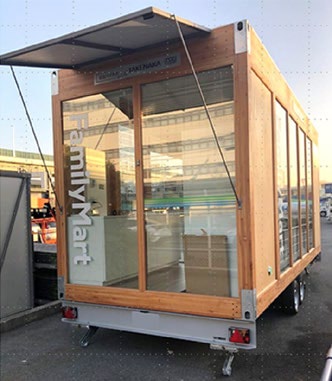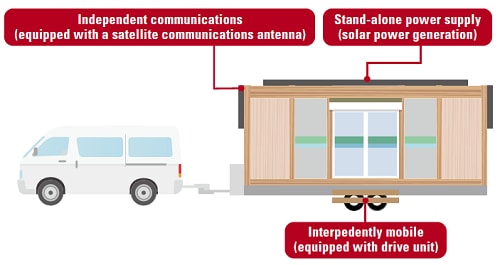Participation in a smart mobile store demonstration test at the Expo 2025 Osaka, Kansai, Japan construction site
Improving work environments at construction sites lacking infrastructure facilities
Large construction sites often lack supply infrastructure such as electricity and water, and typically there are no stores. As a result, construction site workers must leave the site to buy the supplies and food they need. In some locations, stores are far away, and reducing travel time has been a long-standing challenge. Hitachi High-Tech, in collaboration with Takenaka Corporation, CROCO ART FACTORY, and FamilyMart Co., Ltd., opened an automated smart mobile store equipped with our stand-alone power supply system at the Expo 2025 Osaka, Kansai, Japan construction site for demonstration purposes. This facilitates the provision of products and services to those working on construction sites, leading to improved working conditions.

Smart mobile store
Responding to emergencies through the continuous remote monitoring of power supply conditions
The automated smart mobile store was developed from Takenaka Corporation’s towable off-grid mobile home, which is used as a mobile construction office. Hitachi High-Tech provides a stand-alone power supply system comprising solar panels, storage batteries, and control equipment. This equipment facilitates a stable supply of power for a certain period of time, even in areas without existing power sources or generators. Electricity generated by the solar panels is used to charge storage batteries and power air conditioning and other equipment in the mobile store. The mobile store is also equipped with satellite internet, facilitating independent communications. Store power supply conditions are remotely monitored and controlled via the cloud, enabling rapid responses in the event of an emergency.

Smart mobile store features
Expanding applications and contributing to a recycling-oriented society
By modifying the interior specifications of the smart mobile store developed for this demonstration test, it can be used at construction sites, as well as stores, rest areas, and toilets in areas where ensuring power is difficult when a power outage or disaster occurs. In the future, we also expect these facilities will also be used as medical facilities in times of disaster, or as branch offices of government agencies in depopulated areas. Going forward, we will expand the use of knowledge gained through this demonstration test both in daily life and in times of emergency, and contribute to the realization of a society in which everyone can live in peace, regardless of location, even in the unlikely event of an emergency. We also aim to contribute to the creation of a recycling-oriented society through our business, for example, by reusing EV batteries as storage batteries.
